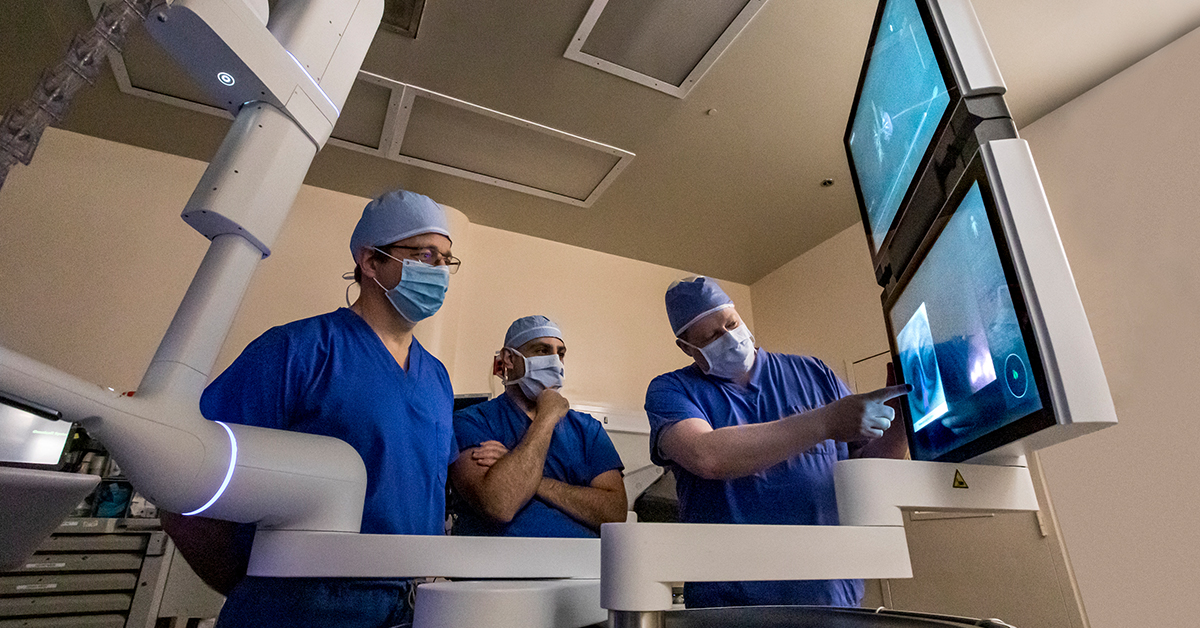Hackensack University Medical Center Expert Weighs in on the Future of Lung Cancer Surgery
Thoracic surgeon anticipates shifts in imaging technology, targeted drug therapies and smoking trends

As a U.S. News & World Report High-Performing Hospital for Lung Cancer Surgery, Hackensack Meridian Hackensack University Medical Center is at the forefront of today’s pioneering technology and techniques—including Ion robotic technology for lung cancer procedures and Firefly near-infrared imaging to identify lung lesions during surgery.
As a result of continued advances in lung cancer surgery, outcomes and survival rates have improved during the past 40 years. Nabil P. Rizk, M.D., Division Chief, Thoracic Surgery, Hackensack Meridian Hackensack University Medical Center and co-director of Thoracic Oncology, John Theurer Cancer Center, predicts that improvements in lung cancer screening, new medications and diminished smoking rates will reduce the need for lung cancer surgery in the future.
Lung cancer screening using low-dose CT imaging is an essential tool that detects lung cancer early, when it is easiest to treat and before it spreads. However, only 3 to 4% of the eligible population participates in routine screening.
“Within 10-15 years, I believe lung cancer screening with imaging will be enhanced and more widely adopted, leading to an increase in the number of patients diagnosed with very early-stage, smaller lung tumors,” said Dr. Rizk. “This will expand the pool of patients who are eligible for surgery, and I believe the technology will evolve to help us provide effective treatment for these very small lesions.”
However, Dr. Rizk said increased identification of these very small lesions may require researchers to take a closer look at indications for surgery compared to active surveillance and develop evidence-based guidelines to help thoracic surgeons determine the best course of treatment.
Smoking rates in the U.S. have also decreased significantly in recent decades, and Dr. Rizk expects that trend to continue. But looking even further down the road, Dr. Rizk said he envisions new screening methods that don’t require imaging at all.
“With current advances in liquid biopsy technology, we may be able to detect circulating tumor DNA through a blood sample or conduct screening through a breath test,” said Dr. Rizk.
Advances in next-generation sequencing of lung tumors are contributing to the development of novel drugs for lung cancer—including effective immunotherapy and targeted therapy options with low toxicity profiles.
“Within 30 to 50 years, it is reasonable to believe that lung cancer may be able to be treated effectively with medications, and the risk/benefit profile of these drugs would outweigh the risk/benefit profile of surgery,” said Dr. Rizk. “Although I think we will initially see more patients who require lung cancer surgery due to enhanced screening methods, as time goes on, I believe we will be performing less and less surgery due to the availability of more non-surgical options to treat early, advanced and metastatic disease.”
Learn more about innovative pulmonary and thoracic surgery care at Hackensack University Medical Center.